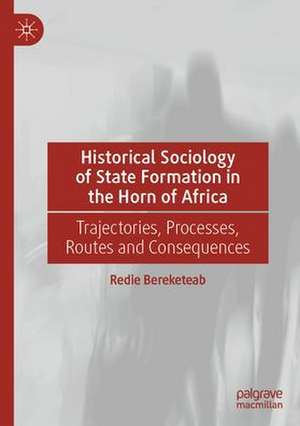Historical Sociology of State Formation in the Horn of Africa: Genesis, Trajectories, Processes, Routes and Consequences
Autor Redie Bereketeaben Limba Engleză Hardback – 29 mar 2023
Preț: 777.12 lei
Preț vechi: 947.70 lei
-18% Nou
Puncte Express: 1166
Preț estimativ în valută:
148.79€ • 152.63$ • 125.27£
148.79€ • 152.63$ • 125.27£
Carte tipărită la comandă
Livrare economică 26 februarie-12 martie
Preluare comenzi: 021 569.72.76
Specificații
ISBN-13: 9783031241611
ISBN-10: 3031241614
Pagini: 247
Ilustrații: XIII, 247 p. 4 illus., 3 illus. in color.
Dimensiuni: 148 x 210 x 21 mm
Greutate: 0.47 kg
Ediția:2023
Editura: Springer International Publishing
Colecția Palgrave Macmillan
Locul publicării:Cham, Switzerland
ISBN-10: 3031241614
Pagini: 247
Ilustrații: XIII, 247 p. 4 illus., 3 illus. in color.
Dimensiuni: 148 x 210 x 21 mm
Greutate: 0.47 kg
Ediția:2023
Editura: Springer International Publishing
Colecția Palgrave Macmillan
Locul publicării:Cham, Switzerland
Cuprins
Chapter 1: Introduction: Challenges of State Formation.- Chapter 2: Theories of State Formation.- Chapter 3: Proto-state Formation: Ethiopia.- Chapter 4: Colonial State Formation.- Chapter 5: The National Liberation State.- Chapter 6: State Legitimacy and Government Performance in the Horn of Africa.- Chapter 7: Common Characteristics of the Three Typologies of State Formation: Synthesis.- Chapter 8: Conclusion.
Notă biografică
Redie Bereketeab is Associate Professor of Sociology and Senior Researcher at the Nordic Africa Institute at Uppsala University, Sweden. His latest publications include: National Liberation Movements as Government in Africa (2019), and Alternatives to Neoliberal Peacebuilding and Statebuilding in Africa (2021). His research interest include political sociology, development sociology, African studies, conflict, peacebuilding, regional integration.
Textul de pe ultima copertă
This book analyses the historical sociology of state formation in the Horn of Africa. It examines the genesis, trajectories, processes, routes and consequences of the evolution of state formation. Three analytical and explanatory models explain the process of state formation in the HOA: proto-state, colonial and national liberation. The models, heuristically and innovatively, provide understanding, interpretation and analysis of state formation. While the proto-state model explicates an indigenous historical process of state formation, the colonial model refers to an externally designed and imposed process of state formation. The national liberation model concern state formation conducted under liberation movement and ideology. The distinct significance of these models is that collectively they generate sufficient analysis of state formation. They are also unique in that they have never been employed as aggregate analytical and explicative instruments to address the predicament of state formation in the Horn of Africa.
Redie Bereketeab is Associate Professor of Sociology and Senior Researcher at the Nordic Africa Institute at Uppsala University, Sweden. His latest publications include: National Liberation Movements as Government in Africa (2019), and Alternatives to Neoliberal Peacebuilding and Statebuilding in Africa (2021). His research interest include political sociology, development sociology, African studies, conflict, peacebuilding, regional integration.
Caracteristici
Analyzes the historical sociology of state formation in the Horn of Africa Examines the genesis, trajectories, processes, routes, and consequences of the evolution of state formation Written by Redie Bereketeab
